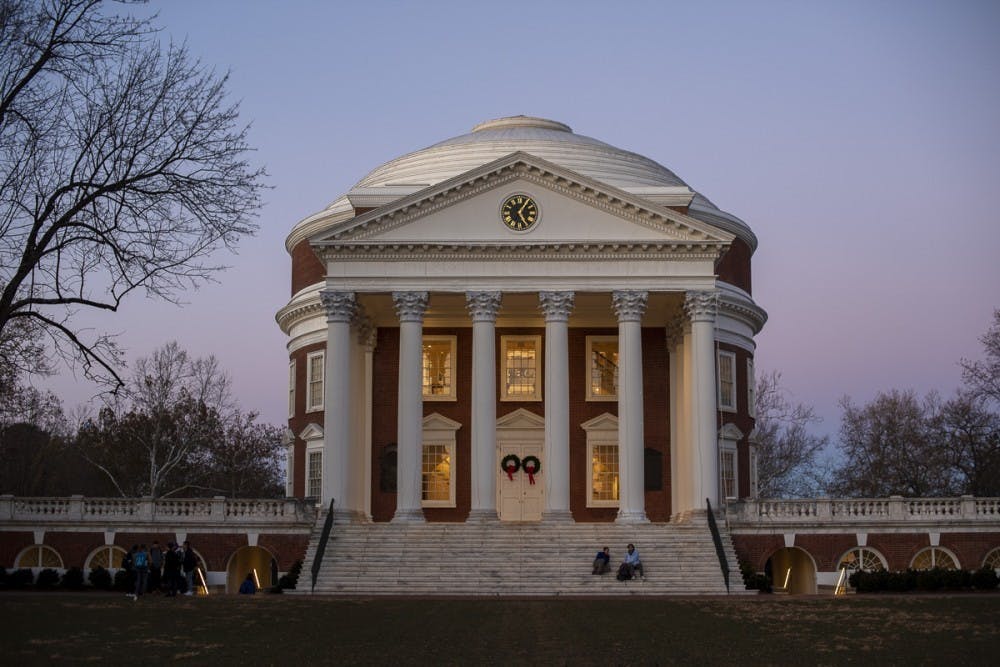Last week, the University Judiciary Committee released its spring semester case statistics after beginning its new term April 1. UJC takes on cases that violate the University’s Standards of Conduct, ranging from disorderly conduct on University property to intentional disruption or obstruction of University activities. Over the spring semester, the group finalized 12 of cases, with an additional eight still pending. Most importantly, the data included in the report shows that UJC employs sanctions that promote rehabilitation— those found guilty are not expelled, but encouraged to learn from their mistakes and remain in the University community. Having previously written in favor of a rehabilitative form of student self-governance on Grounds, we are encouraged by UJC’s report this semester and urge those found guilty to recommit themselves to the community of trust.
First and foremost, per their report, UJC did not expel students nor permanently ban organizations from Grounds. Instead, UJC chose sanctions that would allow students and organizations to learn from their mistakes. The UJC trial system allows judges to choose between applying no sanction, a single sanction or multiple sanctions to a party who is found guilty, meaning a single party can have several sanctions applied concurrently. Some of the most common sanctions over the past few semesters include writing essays, talking with a dean or advisor and doing community service. We favor a system that is restorative rather than punitive and places students’ wellbeing first. The UJC case data appears to do exactly that — working with students and organizations to better themselves instead of using strict punishments.
A unique responsibility included in the scope of UJC’s work is the adjudication of entire organizations. Still, when tasked with implementing sanctions that affect large groups of individuals, UJC employed specific and useful sanctions, such as adjustments to organizational rules and regulations, the creation of a leadership transition document, presentation delivery requiring 80 percent member attendance and notification of national organizations. Additionally, UJC suspended four organizations this semester and another five organizations received suspensions in abeyance — meaning that suspensions will be enacted should the accused party receive another violation. Organizations in abeyance are made aware that should they violate the community of trust again, they will be suspended. Moreover, none of these consequences are meaningless. Each teaches members of organizations found guilty to be more conscious neighbors within the University community.
It does not escape our attention that five of the six organizations found guilty violated SEC-045, which outlined public health guidelines throughout the pandemic, nor were we surprised that all five of these organizations were fraternities. This behavior is reprehensible — these actions put the lives of all others on and around Grounds at risk. More so, however, this was avoidable. Though the University claimed there was little evidence Greek organizations were responsible for an uptick in COVID-19 cases on Grounds, this report reveals just the opposite — this is the second time a UJC report has confirmed suspicions of Greek life breaking COVID-19 guidelines. While we acknowledge the University did not have confirmation that these violations took place at the time, the fact remains that widespread allegations of fraternities breaking COVID-19 policies ran rampant across Grounds. While the University was performatively employing ambassadors to micromanage students eating on the Lawn six feet apart, the more serious abuses of public health guidelines were taking place elsewhere — inside fraternity basements haphazardly concealed by trash bags on windows. Clearly, its resources were misplaced.
In recent months, UJC has not been the focus of conversation — particularly in comparison to Student Council and the Honor Committee. Considering that there are little to no public health guidelines to break anymore, one might assume the committee’s relevance would dwindle. We, however, disagree. UJC can — and we believe, will — remain relevant by serving as a model for what a rehabilitative system might look like on Grounds.
That being said, UJC still has a long way to go. Though these reports are helpful, we propose that UJC clarifies and justifies sanctions when describing the outcomes of each case — this would only aid in its efforts to be more transparent. Secondly, UJC is plagued by the same lack of awareness and buy-in that all student self-governance organizations — the Honor Committee and Student Council included — face on Grounds. To begin to solve this problem we believe UJC must engage with the student body outside of just adjudicating individuals and organizations. As an institution with the time, means and resources of doing so, the responsibility for bridging this gap is in UJC’s hands. We encourage students, however, to make a dedicated effort to meet the committee halfway.
The Cavalier Daily Editorial Board is composed of the Executive Editor, the Editor-in-Chief, the two Opinion Editors, their Senior Associate and an Opinion Columnist. The board can be reached at eb@cavalierdaily.com.







